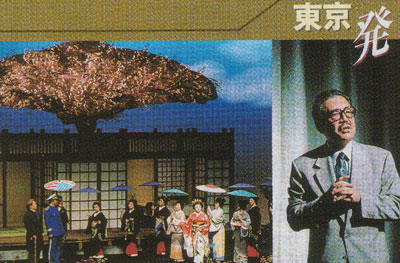
Next year, Puccini's "Madama Butterfly" will reach a century since its debut on the stage. The dramatic scale of the playwright and exotic atmosphere in the music is loved by many, and in this respect, this masterpiece finds itself even nowadays being performed regularly at most places all over the world. Alas, it is not at all unusual, that our country Japan is still being introduced by a queer series of details, even today in this information developed age, let alone the olden days where few would have had any idea about our culture and customs.

It has not been until recently that we found this person who decided to stand no longer with this humilating situation, and feel honored to introduce OKAMURA Yasuo, one of our leading Bass Bariton opera singer. His action was was to give a regular performance of "Ciocio-san" (a revised edition of "Madama Butterfly") at the Tiara Koto Hall in Sumiyoshi, Tokyo, on the 26th and 27th July this year, with the "NPO Minnano Opera / Opera del Popolo" that he founded with the vision to entertain more and more people with no need of preliminary knowledge before coming to the opera. He was successful to give birth to a brand new version of "Madama Butterfly", by casting mostly young talents such as MIZUNO Takako and NINOMIYA Sakiko as Ciocio-san (Madama Butterfly), all selected at a public audition, and with an enthusiastic accompaniment from the Tokyo City Philharmonic Orchestra conducted by Regular Conductor IIMORI Taijiro.
This revision entitled "The first correction of misconceptions since the first public appearance" is based on the following details: Ciocio-san, married to Pinkerton, learns to speak Italian (English, in reality) during their rendezvous each time his ship enters the Nagasaki Port. Sharpless can speak Japanese, as is natural for his carreer as a consul, the marriage agent Goro knows how to speak Italian. Pinkerton and his wife Kate do not understand Japanese, and all other Japanese citizens understand only Japanese. Thus all scenes where Japanese talk to each other are sung in Japanese translated lyrics.
OKAMURA not only did all the directing, translating, and dramatizing, but also fed in narrational parts, so that any visitor could understand the story without preliminary knowledge.
He thinks back to his former days at the opera houses in Europe, where he was always casting for Bonzo at "Madama Butterfly" performances. "A priest should be bald-headed, but this one is wearing a *chonmage, holding a **torii with the words #"Nan-mu-myu-ho-ren-ge-kyo" on it. Totally outrageous." This experience led him to a firm sense of mission to "bring this [Ciocio-san] overseas and show the world how it was really like in Japan in those days as should have been described."
by TAKAYANAGI Hiroshi
* (A topknot hairstyle, usually popular among the Samurai class and other citizens until the Edo era.)
** (A sacred arch: gateway at the entrance to a Shinto shrine.)
# (The main phrase in the Lotus Sutra, one of the major Buddhist denomination.)

